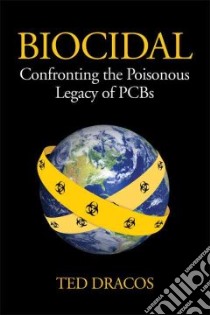Biocidal - 9780807006122
Un libro in lingua di Ted Dracos edito da Random House Inc, 2010
- € 26.80
- Il prezzo è variabile in funzione del cambio della valuta d’origine
In 1962, Rachel Carson stunned the world with the publication of Silent Spring, exposing the lethal character of the pesticide DDT. Her work launched a global campaign against synthetic chemical toxins and veritably created a world environmental movement. But unbeknownst to Carson, an even more insidious chemical cousin to DDT had been silently poisoning the biosphere.
Polychlorinated biphenyls (PCBs) were first manufactured in 1920. Seen as a “magic fluid,” they were a cheap and stable heat-transfer material used as a critical coolant in big power grids. The chemical industry soon went on to develop hundreds of other uses for this highly toxic group of substances—everything from copy paper and paint to hydraulic fluids. Despite being outlawed in the U.S. since 1976, PCBs are currently found in the remotest corners of Earth and remain the most prevalent group of industrial chemical contaminants in much of the world. Every human being, from the womb to the grave, bears a body burden of these poisonous molecules forever locked in their blood and tissues.
In Biocidal, investigative journalist Ted Dracos tells the full story of PCBs for the first time, starting with the chilling chronicle of how the chemical industry manipulated regulatory agencies and scientific findings for decades to continue to reap huge profits, despite their knowledge of the threats posed by their “magic fluid.” Dracos draws on extensive research to document the connection between PCBs and catastrophic human illness, presenting the latest science as studies draw ever more disturbing links between PCBs and continued health impacts ranging from cancer and autism to immunosuppression and reproductive abnormalities.
Biocidal also explores the science behind the threat PCBs pose to Earth's biodiversity: today, killer whales in the Puget Sound are dying, the eggs of Ontario Lake trout are doomed before they can hatch, 99 percent of the freshwater eels of Europe have disappeared, and frogs around the world are going extinct. While these disasters have many possible causes, evidence pointing to PCBs keeps accumulating, much like the toxins in these animals' systems.
Nonetheless, Dracos leaves readers with a profound message of hope: the damage is not irreversible. In fact, cleanup efforts that involve the removal of the source of PCBs can really work, and quickly. Offering a simple blueprint for steps that can be taken to reduce the impacts of all industrial chemicals, Biocidal ultimately points the way toward a detoxified world.
Informazioni bibliografiche
- Titolo del Libro in lingua: Biocidal
- Sottotitolo: Confronting the Poisonous Legacy of PCBs
- Lingua: English
- Autore: Ted Dracos
- Editore: Random House Inc
- Collana: Random House Inc (Hardcover)
- Data di Pubblicazione: 09 Novembre '10
- Genere: NATURE
- Argomenti : Polychlorinated biphenyls Toxicology Polychlorinated biphenyls Environmental aspects Polychlorinated Biphenyls history United States
- Pagine: 294
- ISBN-10: 0807006122
- EAN-13: 9780807006122


